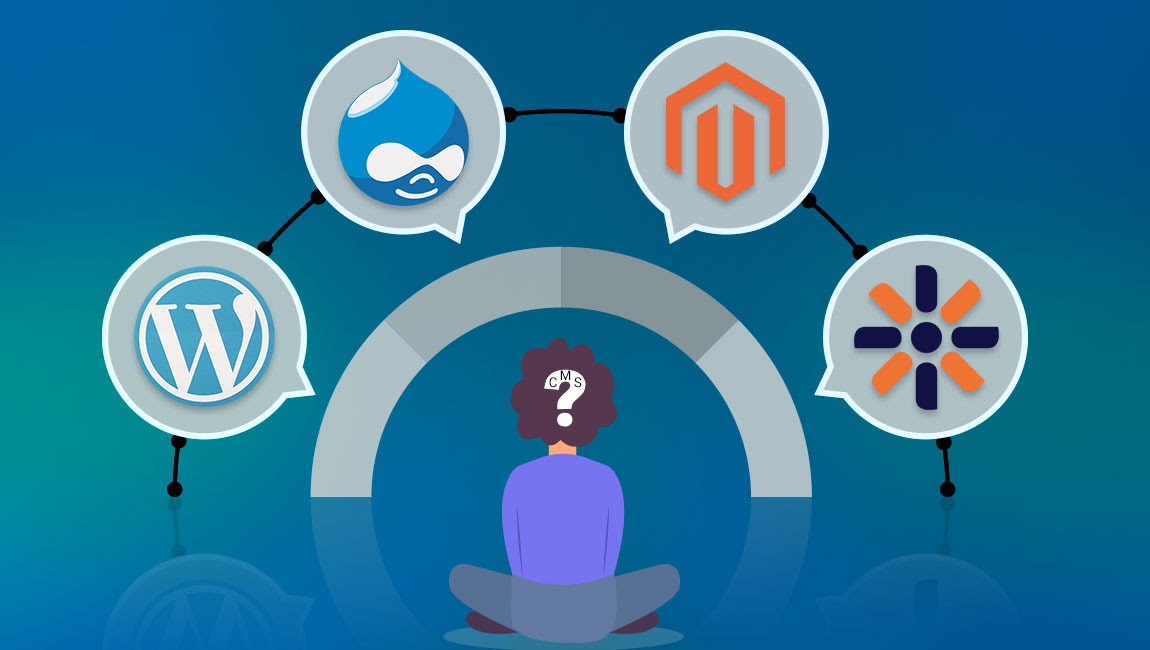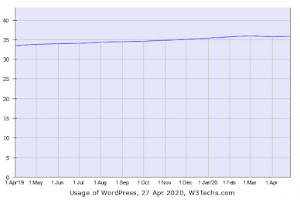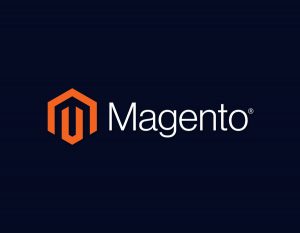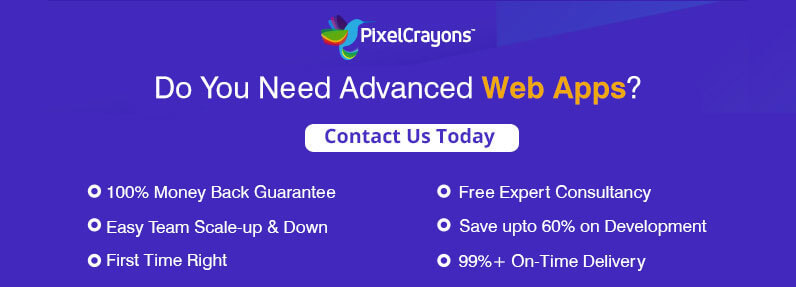If you are looking to build a website, then selecting the right & best CMS is the first step towards web development. It becomes essential for you to stay ahead of the competition by offering the best experience to your clients.
If you are eager to attract the maximum potential audience to your website, then publishing alluring content can keep your visitors engaged.
To maintain the quality content on your website, you must update and publish it and also manage it attractively. This would not be possible without CMS, and choosing a CMS that is best suited for your business requires a sheer understanding of the platform, including their comparison.
So, here through this article, I will give you an overview of the most demanding CMS.
WordPress, Magento, Drupal, and Kentico are the most widely used CMS platforms, but which is the best for building your business website? Let’s find out.
Table of Contents
WordPress
WordPress is one the most popular and extensively used CMS, with approximately 18 million downloads; thus, it is the most used open-source CMS worldwide.
As per W3Techs, WordPress is powering 35% of the web, including those without a CMS or with a custom-coded CMS.
It comes with several extensions for necessary installation, which makes it possible to upgrade to a fully functional CMS.
About half of the sites are using free hosting from WordPress.com, and it accounts for 18.9% of the market share in the self-hosted website sector.
WordPress is the easiest CMS to provide designers and developers with enough features to create a useful site for customers. It is ideal for creating simple websites.
Due to its vast proliferation, WordPress is also a popular target for hackers. So, you can hire WordPress developers to make your WordPress software more secure.
Advantages of WordPress:
-
Easy-to-use Interface
WordPress provides a broader selection of development themes and also great tutorials and support, making it great for non-technical users.
Do not worry if you lack basic knowledge of HTML coding; WordPress gives you a way to add blog posts, pages, products, media quickly, and edit current content. You can also count on the support and guidance of the WordPress community when you are stuck somewhere.
-
Add sophisticated features to websites
The advanced WordPress plugins add sophisticated features to your website without placing a coder.
If you want to strengthen the performance of your website, WordPress offers you thousands of plugins to meet your business needs, whether you look for a full-featured website or a simple contact form.
-
SEO friendly
With expansion at the heart of the WordPress philosophy, several awesome plugins make any marketer lift very easy.
Everything you want to do to build a search engine optimized website can only be realized by installing multiple WordPress plugins. One of these plugins is Slim SEO, an easy-to-use plugin that will automate all the SEO work for your websites after being installed without any setup
-
WordPress is Mobile Ready
In this mobile-driven era, you should make your site look great and work well on a tablet or smartphone. Most WordPress themes have been made responsive so that your visitors are not challenged to use your website on their mobile devices.
Besides, the WordPress dashboard can work correctly on both full-size PCs and mobile devices, allowing you to manage your website from anywhere easily.
WordPress development companies can help in providing secure, scalable, feature-packed, and mobile-friendly WordPress CMS solutions.
Let's connect virtually or ask for an estimate of your project.
Who Should Use WordPress?
If you host your website, then WordPress is the right CMS platform for you. Those who are already familiar with managing their site will be just fine with this.
Also, if you wish to make a professional website without spending a lot of money then go for it.
Drupal
Previously Drupal was designed as a student community solution and now has evolved into a full-fledged, complex PHP-base open source CMS.
While it comes up with easy installation, most of the Drupal users are advanced developers, as it has a very sophisticated coding interface.
The users of this CMS must have a sheer understanding of HTML, PHP, and CSS. The CMS is SEO friendly and comes with practical modules and clean codes.
Drupal is famous for its robust classification and the ability to tag, organize, and categorize complex content. Many extensions in Drupal make it possible to implement company portals with multi-domain structures.
If the essential functions of the software are not sufficient, then some additional modules can be easily installed. There are plenty of advantages to using Drupal for your CMS needs.
Advantages of Drupal:
-
Flexible and Extensible
Drupal is well-known for a highly configurable administrator that allows for a user and role-based permissions as well as workflows.
You can tailor and recreate any part of the admin to meet your business needs. Also, due to the world’s most significant developer following, Drupal continues to evolve and often releases new modules.
Multiple modules are available to all users so that you can use them to improve your business website and add extensible features. Besides, to make your site more appealing, you can contact any Drupal companies in India for assisting in your website.
-
Easily Adaptable
Drupal is the best CMS platform for businesses as it easily adapts to different businesses and requirements.
Regardless of your business size, you can successfully implement Drupal. It also facilitates you to create any type of content, and there is no need to make code modifications.
-
Vast Community Support
Whenever you face a technical problem or anything like that, you will never feel alone, as you can get support for the Drupal community by a simple web search.
Many common issues and problems have already been described and resolved, so you can easily find solutions in the documentation.
Let's connect virtually or ask for an estimate of your project.
Who Should Use Drupal?
Drupal is an absolute choice if you have a web app or any type of web project that requires user permissions. It is the best choice for enterprise-level websites and web applications. Drupal is also more flexible when it comes to API development.
Kentico
Kentico is a web content management system (WCM) that is used to create websites, online stores, intranets, and Web 2.0 community sites.
It allows users to manage the content, track customer journeys, and analyze the results of dynamic websites.
Kentico makes use of ASP.NET and Microsoft SQL Server for development via its Portal Engine, through Microsoft MVC. It is also compatible with Microsoft Azure.
Additionally, WCM is fully integrated with Kentico’s online marketing solution. That means you can automatically deliver experiences through multiple channels across all devices.
Advantages of Kentico:
-
Customizable features
With a comprehensive set of sophisticated features and absurd levels of customizability, you can use the technology around your vision and unleash your imagination.
-
Scalable
The open API of Kentico can easily integrate with virtually anything, and with advanced scalability, you can ensure that your needs will never extend beyond the platform.
-
User-friendly platform
Kentico is an easy-to-use platform that allows users to edit quickly and update systems. It further will enable companies to serve more accurately and effectively.
-
Highly Secure
Security is one of Kentico’s top priorities for your website. You can easily integrate your user database or authentication service, or use one of the standard authentication methods.
With Kentico’s security features, you don’t have to worry about your website getting hacked or data tampering.
-
Future-ready
By using Kentico’s comprehensive support for the MVC development model, your projects can take advantage of the latest web development trends and easily keep up with the future.
And to make your website future-ready, you can take help from the Kentico development companies in India.
Who uses Kentico?
Kentico is designed to meet the requirements of web developers and their clients. It is most often used by companies with 10-50 employees and $ 1M – 10M in revenue.
Let's connect virtually or ask for an estimate of your project.
Magento
Magento is the most well-known and extensively used eCommerce platform for website development. It is widespread and a preferable choice because of its wide range of functionalities and plugins.
It gives online merchants complete control over the appearance, content, and functions of the website.
The CMS has a highly intuitive administrative interface and provides excellent features for search engine optimization, catalog management, and marketing tools to give online merchants the power to edit their sites that fit their business needs.
On average, merchants using Magento grow three times faster. More than 250,000 merchants worldwide use this powerful CMS as their eCommerce platform.
Advantages of Magento:
-
Highly Efficient
One of the advantages of choosing Magento is the ability to be efficient with abundant sources. eCommerce sites that run Magneto can handle thousands of products at once and can also run many various stores at the same time.
It merely means that no matter how much your business grows, you don’t have to worry about upgrading to another platform.
-
Advanced Search Engine Optimization
As a bonus, Magento is SEO-friendly, so optimizing product pages and descriptions are quite simple. It also produces SEO-friendly URLs and meta descriptions, meaning that you won’t have to worry about creating them yourself.
-
Customizable
Everything from the look of your site to the way you configure your product categories and features is custom made with Magento. However, it is essential to note that this level of customization means that almost everything needs to be coded from scratch.
However, there are some design themes available on Magento’s site, most business owners who use the CMS generally prefer to hire Magento developers for a unique and customized website.
-
Mobile-Friendly Configuration
Sites created using Magento are fully mobile responsive, so they are compatible with all browsers and screen sizes.
Magento shopping carts are developed responsibly, allowing them to be viewed seamlessly on smartphones, tablets, and other mobile devices. This accommodates a consumer shopping trend that continues to move towards mobile usage.
Let's connect virtually or ask for an estimate of your project.
Who Uses Magento?
Many successful eCommerce enterprises rely on Magento, such as Nike Australia, Rosetta Stone, Harper’s Bazaar, Volcom, Rebecca Minkoff, and Sierra Nevada Brewing company.
So, if you want to build your eCommerce store online, using Magento can work wonders as the platforms come in all shapes and sizes and are easily designed for any company’s products. Here, a good eCommerce development company will greatly benefit from having some experienced Magento developers in its ranks.
Which CMS is right for you?
Ultimately, the right CMS for you depends on what you are looking for in the CMS platform. When selecting any CMS, you check their functionality, popularity, supportive plugins available or not, etc.
If you want to add eCommerce functionality to your existing website, Magento is a great option. Magento is the more efficient and recommended alternative to WordPress, Drupal, and Kentico when it comes to selling products online.
WordPress is also the best and most highly demanding CMS. WordPress offers an extensive selection of themes and great tutorials and support, making it great for non-technical users.
Through WordPress, any newbie can easily develop a website within a very less time period.
If you are a Large scale enterprise looking to develop a Complex and advanced website where scalability and stability are more important than the user interface, Drupal is the right option for you.
Kentico is geared toward companies looking to manage an omnichannel presence. It is great for managing multiple websites and multiple environments. Kentico is a great bet for marketers who want to take online marketing initiatives.
Wrapping Up
Choosing the right CMS is a difficult task. You have to stabilize many requirements, evaluate plenty of options, and choose something that meets all your needs. The CMS platform is the best way to help your business outshine in the coming years.
After reading the article, you should now have a better understanding of major CMS platforms: WordPress, Kentico, Drupal, and Magento and which one to choose as per your requirements. Hopefully, the blog helps you out to select a CMS that exactly suits your requirements.
Frequently asked questions:
Q1. Which CMS platform is perfect for my eCommerce project?
Ans. Magento is a great bet for your eCommerce project. It comprises all the functionalities which are needed to build an online store.
Q2. How long will it take to create a website?
Ans. At Pixelcrayons, we address time concerns by completing websites in significantly less time. Our website development process is quite easy to understand that we can provide services to our customers in less than half the time.
Q3. Where can I hire a WordPress developer?
Ans. You can hire the best WordPress developer from PixelCrayons. The company has successfully completed over 13800+ projects which is enough to tell how experienced and skilled the developers at PixelCrayons are.
Q4. What are the advantages of a CMS platform?
Ans. CMS is handy, and even non-developers can easily use it. It upgrades your ability to perform site maintenance; design changes are relatively straightforward.
Q5. What should I do if there is any problem while using the CMS?
Ans. If you encounter any problems on your website, you can always contact our customer support for any assistance needed to understand the CMS better. Please feel free to email us anytime, and we will get back to you immediately.
Q6. Does CMS help to hit target goals?
Ans. A CMS will help you in achieving your goals. If your goal is to upload more content, and there is no obstruction in creation, then a CMS will be a valuable asset. To see what CMS is right for you, you need to understand the problem clearly.
Q7. I want to migrate to a new CMS, will it harm my SEO?
Ans. No, it does not harm the SEO of your website. The CMS is compatible with your current analytics setup. It follows best practices to help your site get ranked faster.










Quite an elaborative piece of article. If you are looking for eCommerce, go for Magento.
I guess WordPress and Magento are best. If you have a limited budget then you should go with WordPress or starting an e-commerce business then choose Magento blindly.
Thank you Mr. Bhagat. I found all the required information in this blog.